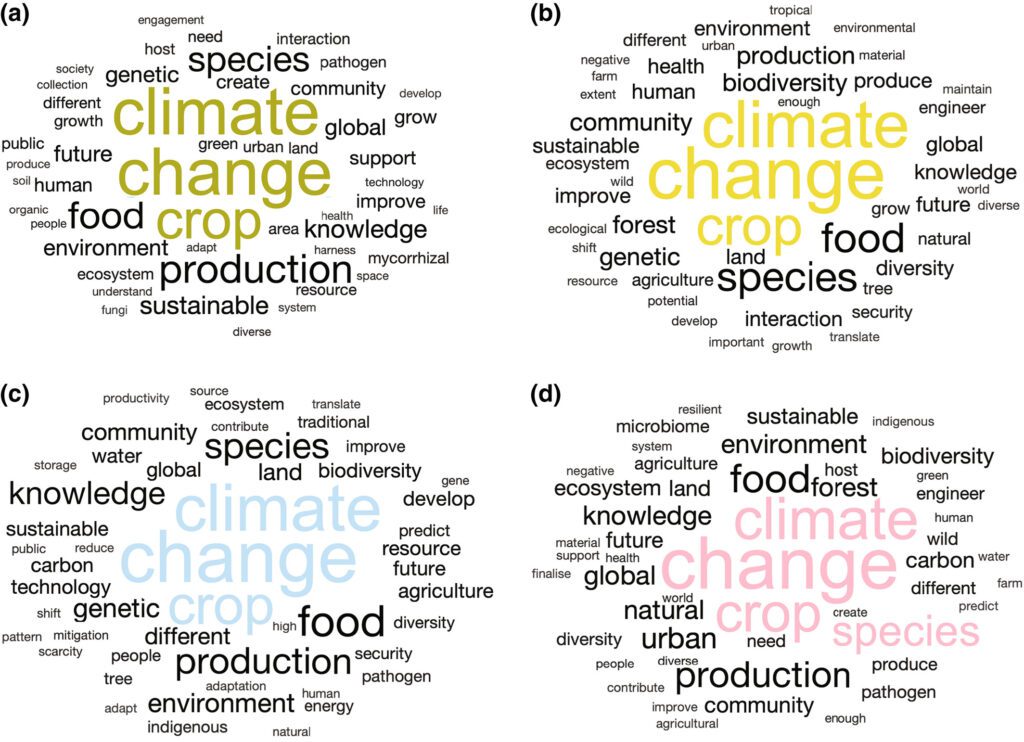A group of researchers compiled the most important questions facing the plant science community. As it turns out, biotech can provide answers and solutions to many of them.
The “One Hundred Important Questions Facing Plant Science Research” project, led by researchers at the University of Bristol in the U.K., seeks to identify current issues facing plant science.
The researchers collected more than 600 questions from a diverse group. Then, a global panel narrowed it down to the 100 most important, they explain in New Phytologist. These 100 questions primarily focus on the important role of plant science in addressing climate change.
“The world’s growing population needs plant science to help deliver safe and reliable food, fuel, building materials, textiles and paper; but global inequalities exacerbated by a changing climate mean these basic requirements are frequently not realised equitably,” they wrote. “Equally, plants provide a critical avenue for climate change deceleration.”
The most important questions facing plant science
After reviewing all questions, the researchers identified 11 areas of “critical global importance.” They are:
- Climate change: How will climate change impact plant abundance, productivity, bioregions, and ecosystems?
- Science in the community: How can we ensure that the varied goals and needs of our diverse societies are understood and fulfilled by plant scientists?
- Food security: How do we leverage existing genetic diversity to create climate-resilient crops?
- Biodiversity: How does species diversity develop in novel ecosystems such as restored agricultural land, forests, grasslands, and gardens?
- Sustainability: Could plant-defense priming be a platform for a new green revolution?
- Plant–plant interactions: How are interactions between plant species regulated?
- Plant disease: How should we prepare for novel pathogens of trees, crops, and the natural environment?
- Plant–microbiome interactions: How does the plant microbiome affect stress tolerance?
- Plant adaption: What is the plasticity of the epigenome of plants?
- Plant stress responses: How do plants cope with combined stressors?
- Ecosystem services: What natural materials could be invested in for a more sustainable future of manufacturing or residential development?

Additional questions were organized into four broad categories.
Category A: Plants and Society
Question #13 is especially relevant: How should the scientific community better represent the benefits and risks of GMOs and gene-edited plants to the public?
As we’ve reported, when consumers have information about gene editing, they are more likely to accept it and have a positive attitude about it. A recent report, “Consumer Attitudes, Trust, and Acceptance of Bioengineered and Gene-Edited Food Under the National Bioengineered Food Disclosure Standard,” studied the labeling of romaine lettuce and its impact on consumer acceptance. The report found that consumers’ initial acceptance of gene-edited food compared to organic, and conventional food was low. But when consumers received more information about gene editing and the benefits for nutrition, spoilage, disease resistance, and cost, they were much more likely to accept the gene-edited crop.
The U.S. Food and Drug Administration (FDA) Feed Your Mind initiative seeks to provide educational resources to consumers to ensure they have accurate, science-based information about GMOs and gene-edited crops. The Biotechnology Innovation Organization (BIO) has supported this initiative and others, as well as a framework for responsible gene editing that will help boost education about and acceptance of this technology.
Category B: Plants, Climate Change, and Food Production
In this category, questions covered a variety of topics, from how a changing climate will impact plant diseases (#37) and the ability of plants to grow (#38), to how plants can enhance soil carbon storage (#41). Of course, biotechnology, and specifically gene editing, can help mitigate these problems and offer solutions. As climate change makes plant disease more common and makes it more difficult for crops to grow in changing environments, gene editing can ensure crops can withstand disease (like tree blight) and adverse conditions. For example, we could soon see gene-edited wheat that can grow in drought conditions. In addition, gene editing can enable crops that combat soil salinization and suck up more carbon from the soil.
Question #59 asks: How can microbiomes be harnessed to improve plant function for food and biofuel production and climate change mitigation? Biotechnology is utilizing microbes to mitigate the risk of food crisis. As we’ve reported, plant biostimulants are substances or microorganisms that, when applied to seeds, plants, or soil around roots, enhance nutrient uptake and efficiency, tolerance to heat or drought, crop quality, or yield.
To advance biostimulants, Joyn Bio is a joint venture between the synthetic biology company Ginkgo Bioworks and Leaps by Bayer, the investment arm of life science conglomerate Bayer. (Bayer and Ginkgo are members of the Biotechnology Innovation Organization.)
Category C: Plant-Environment Interactions
This category considers questions about engineering plants to clean up pollution, improve crop breeding, balance plant stress, and address plant pathogens.
Question #82 stands out: How do we better control plant pests without chemical pesticides? Once again, gene editing is the answer. Scientists are using gene editing to develop crops that can withstand pests as well as create biological pesticides.
Category D: Molecular Approaches to Fundamental Plant Biology
This category explores questions around studying the plant genome to address challenges facing plant life.
Question #84 asks, How do we use gene editing technology (CRISPR) to improve food security? This is a question we’ve covered extensively. CRISPR is revolutionizing our food supply for the better. Already, we’re developing essential crops like rice, soybeans, wheat, and canola that can withstand climate change.
What should we do with the answers?
“It is striking how much critically important knowledge we do not currently possess to successfully mitigate and adapt to climate change, including, for example: which crop species and varieties will grow reliably in each region (Qs 1, 3, 9, 10); how much carbon plants can capture and store, which species are best for this, and where they can grow reliably (Qs 41, 46, 86); and how this will be affected by the climate-induced migration of pests and diseases (Qs 7, 37, 75),” conclude the researchers.
By asking these questions, we can conduct plant science research necessary to “actively decelerate, halt and adapt to the consequences of climate change.”




